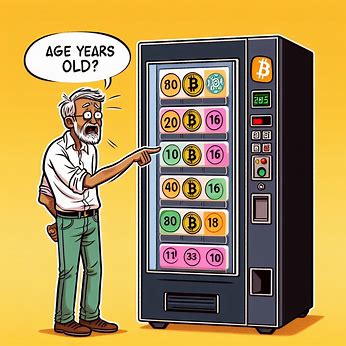Have you ever wondered if there’s an age requirement to buy Bitcoin or other cryptocurrencies? As digital assets like crypto become more mainstream, it’s a question many young people and their parents are asking. How old do you have to be to buy cryptocurrency? The answers to the question can be found here.
1: The Short Answer
In most cases, you have to be 18 years old to buy cryptocurrency on your own. This is because in the U.S. and many other countries, you must be a legal adult to enter into a contractual agreement, like signing up for a crypto exchange.
2. The Longer Answer
While 18 is the typical minimum age, the full answer is a bit more nuanced:
1.Crypto Exchanges
Most reputable cryptocurrency exchanges, like Coinbase, Kraken, and Gemini, require users to be at least 18 years old to sign up and trade. This is to comply with Know Your Customer (KYC) regulations that combat money laundering and fraud.
Some exchanges may allow younger teens ages 13–18 to have accounts linked to a parent or guardian’s account with their permission. But the adult maintains control and is ultimately responsible.
2. Peer-to-Peer Transactions
Technically, crypto transactions can happen peer-to-peer without an exchange between anyone with a crypto wallet, regardless of age. But selling crypto to a minor would be legally questionable in many jurisdictions.
3. Exceptions for Emancipated Minors
In rare cases, people younger than 18 who are legally emancipated minors may be able to trade crypto on their own. This requires going through a legal process to get approval from a court to conduct business as an adult.
4. Inheriting or Receiving Crypto Gifts
There’s no inherent age restriction on simply holding cryptocurrency in a wallet. A minor could receive crypto as a gift or inheritance. But cashing out those funds into a bank account would still usually require being 18 or older.
Why is 18 the Standard Minimum Age?
The age of 18 is generally considered to reach the “age of majority” and gain the legal rights of an adult in many countries, including the U.S., UK, and Australia.
This includes the ability to enter into legal agreements, like the terms of service to use a cryptocurrency exchange. It’s also the age when people gain full control over their own finances.
Protecting young people
Restricting crypto trading to legal adults helps protect young people, who may be more vulnerable to financial scams, fraud, or risky trading choices. Crypto is highly speculative and can involve significant financial risks.
Parental Consent for Minors
As mentioned above, some crypto exchanges do allow minors aged 13–18 to trade with the permission and oversight of a parent or legal guardian who’s an adult. The adult retains ultimate control over the account.
Popular exchanges with this option include:
However, this doesn’t change the fundamental legal age of majority. The adult is responsible for the minor’s actions and can face consequences.
Risks for Underage Traders
Buying cryptocurrency under 18 may seem harmless, but it carries real risks.
1. Legal issues: Engaging in contracts or business as a minor can cause legal problems, even unintentionally. A crypto exchange could freeze or close the account.
2. Financial risks: Crypto is volatile, and it’s easy to lose money, especially for inexperienced traders. Minors have limited recourse if they’re scammed or make bad trades.
3. Personal data: Exchanges collect personal information for KYC/AML compliance. There are risks associated with minors sharing sensitive data online. The safest path is to wait until 18 before buying cryptocurrency directly. Younger people interested in crypto can still learn about the technology and industry or even practice trading with small amounts under parental supervision.
Related: Best Cryptocurrency Reward Credit Cards
Alternatives for Crypto-Curious Teens
If you’re under 18 and eager to get involved with cryptocurrency, there are still ways to explore your interest without directly buying coins:
1: Learn About the Technology
Spend time researching how blockchain technology works, the different types of cryptocurrencies and their uses, and the potential future applications. There are plenty of free online resources to dive into.
2. Practice trading with Play Money.
Some apps and simulators let you practice “trading” crypto with play money to learn how the markets work. While it’s not real money, it can still be educational. Examples include Altcoin Fantasy and Wall of Traders.
3. Develop relevant skills.
Learning to code in languages relevant to blockchain, like C++, Java, Python, or Solidity, can give you a head start if you want to work in the crypto industry someday. You could even try building your own mock blockchain projects.
Related: How to Buy Pepe Coin in 2024: A Beginner’s Guide
4. Participate in online communities.
There are many online forums and communities where you can discuss cryptocurrency and learn from others, like Reddit’s crypto subreddits. Just be aware of the age requirements to join (often 13+) and never share personal information.
5. Attend crypto events.
Some crypto conferences, meetups, or hackathons may be open to attendees under 18. These can be great ways to learn and network. Just be sure to check the age requirements and attend with a parent or guardian if needed.
Key takeaway
1. In most cases, you must be at least 18 years old to buy and trade cryptocurrency on your own. This is the age of legal adulthood in many countries.
2. Some crypto exchanges allow 13- to 18-year-olds to trade with the permission and oversight of a parent or guardian. But the adult retains control and legal responsibility.
3. The age restrictions help protect minors from financial risks, scams, and legal issues. Crypto trading can be very volatile and complex.
4. There are no inherent age limits to simply holding cryptocurrency in a wallet. Minors could receive crypto as gifts. But actively trading or cashing out would still usually require being 18 or older.
5. If you’re under 18 and interested in crypto, there are still ways to get involved by learning about the technology, practicing trading with simulators, developing relevant skills, participating in communities, and attending events with supervision.
6. Trying to circumvent age restrictions to trade crypto as a minor is very risky from a financial and legal perspective. It’s best to wait until you’re 18 to buy and trade cryptocurrencies directly. Focus on learning until then.
Frequently Asked Questions
1: Can I buy cryptocurrency at 16 years old?
In most cases, you must be 18 years old to buy cryptocurrency on major exchanges. Some may allow 13- to 18-year-olds to trade with parental permission, but the adult is legally responsible.
2. Can I buy Bitcoin without an ID or verification?
Reputable crypto exchanges require ID verification to comply with anti-money laundering laws and regulations. Buying Bitcoin anonymously with no ID is very difficult and risky. Underage users and those looking to bypass ID checks are sometimes drawn to questionable methods like Bitcoin ATMs or LocalBitcoins. But this is strongly discouraged, as it’s legally dubious and could facilitate criminal activity.
3. Is it illegal for someone under 18 to hold cryptocurrency?
Simply holding cryptocurrency in a wallet is not inherently age-restricted. A minor could receive crypto as a gift from an adult, for instance. But actively buying, selling, or trading crypto under 18 would typically not be allowed on major exchanges.
4. Can I give crypto to my kids?
Parents or guardians can choose to give cryptocurrency to their kids, similar to giving cash or other assets. But if the child is a minor, the adult is still legally responsible for that property. Once the child turns 18, they will gain complete control. Be aware of potential tax implications for large cryptographic gifts.
The bottom line is that while there are no global laws barring minors from holding cryptocurrency, actively buying and trading crypto typically requires being a legal adult. If you’re under 18, it’s best to focus on learning about the technology until you reach legal age. And as with any investment, always be aware of the risks involved.










